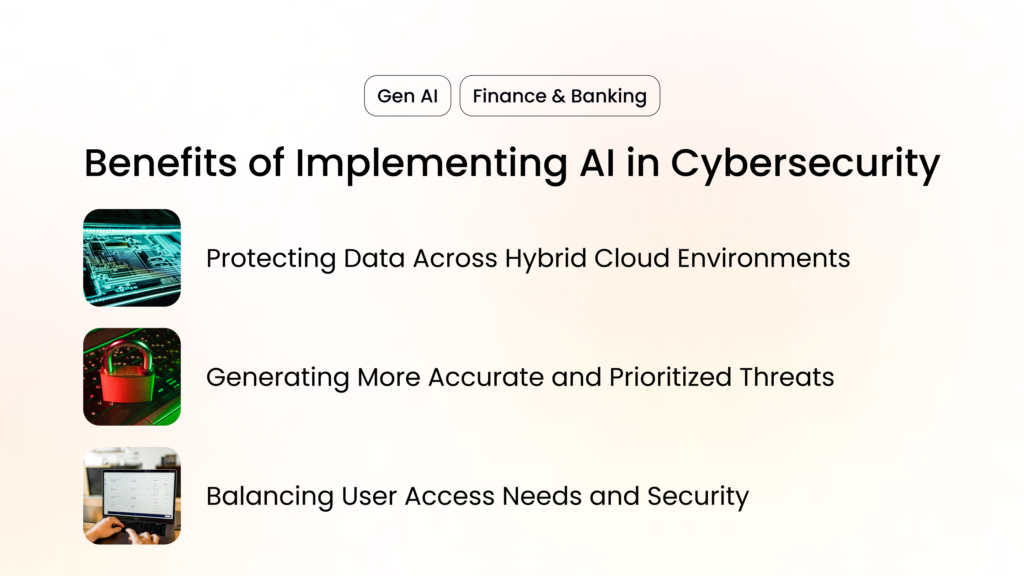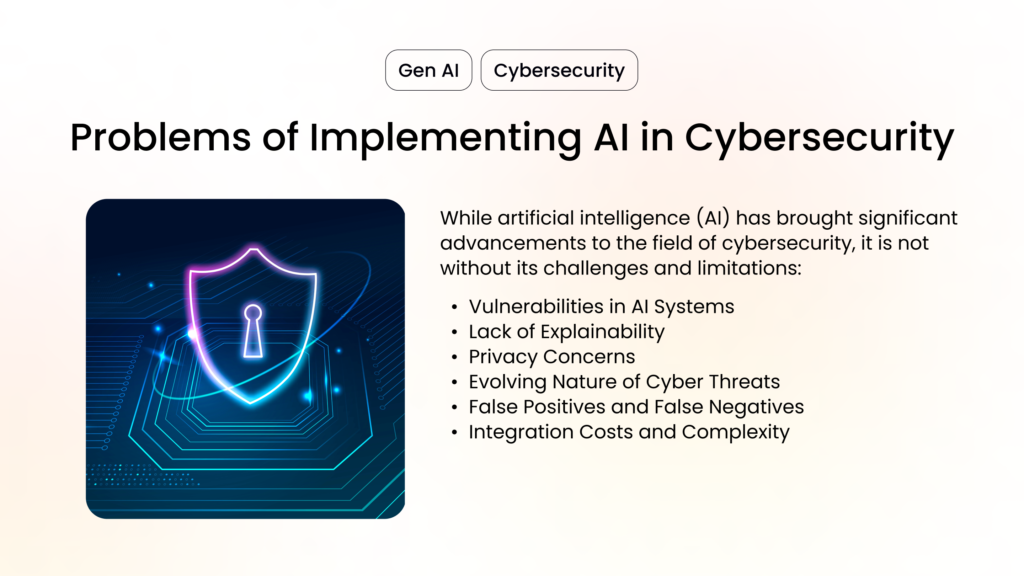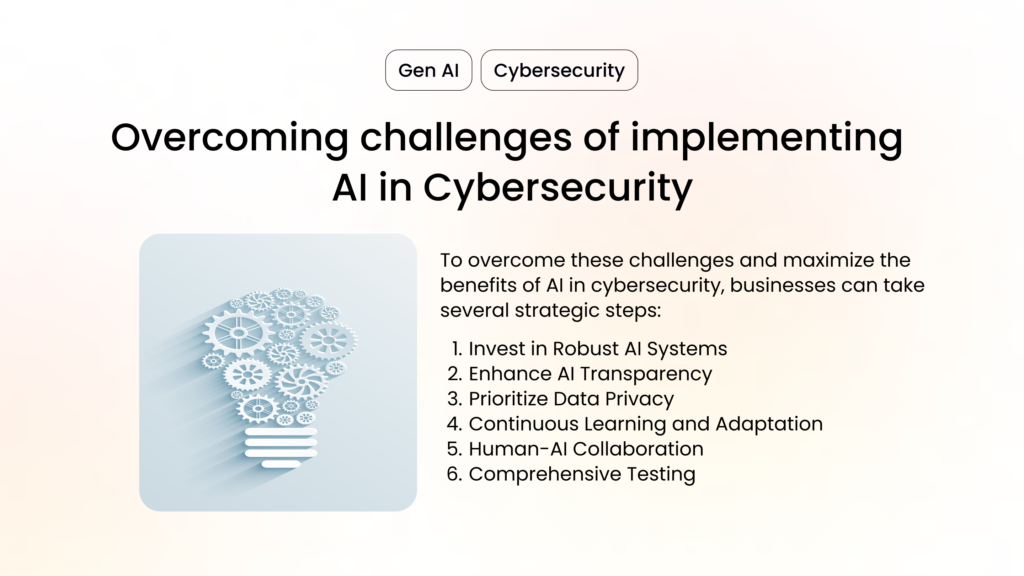Today’s security teams face many challenges – sophisticated cyber attackers, an expanding attack surface, an explosion of data, and growing infrastructure complexity, that hinder their ability to safeguard data, manage user access, and quickly detect and respond to security threats. Deploying robust cybersecurity solutions is essential, especially incorporating AI in Cybersecurity as we navigate an increasingly digital world.
As technology continues to advance rapidly, so do the threats in the digital world. Cybersecurity has become a top concern for individuals and businesses alike. Traditional security measures are no longer sufficient to combat sophisticated cyber attacks. This is where Artificial Intelligence (AI) steps in.
The Growing Need for AI in Cybersecurity
The increasing reliance on AI in cybersecurity is driven by its ability to analyze extensive data and detect patterns indicative of malicious activity. With the escalating volume and sophistication of cyber threats, human analysts cannot match the required speed and precision for effective detection and response.
AI systems continuously monitor networks, endpoints, and user behavior, swiftly identifying anomalies and suspicious activities that might elude human notice. These systems adapt and evolve by leveraging machine learning algorithms, maintaining an edge over cybercriminals.
AI enhances threat detection by automating tasks such as log analysis and vulnerability scanning, freeing security professionals to concentrate on critical incident response rather than manual processes.
Moreover, AI enables real-time response mechanisms. During an attack, AI algorithms can quickly assess the situation using predefined rules or self-learning from historical data. Automated responses may include isolating affected devices, blocking suspicious IP addresses, or launching countermeasures in real time without human intervention.
Benefits of Implementing AI in Cybersecurity

- Protecting Data Across Hybrid Cloud Environments: AI solutions can identify shadow data, monitor for abnormalities in data access, and alert cybersecurity professionals about potential threats by anyone accessing the data or sensitive information—saving valuable time in detecting and remediating issues in real time.
- Generating More Accurate and Prioritized Threats: AI-powered risk analysis can produce incident summaries for high-fidelity alerts and automate incident responses, accelerating alert investigations and triage by an average of 55%. The AI technology also helps identify vulnerabilities and defend against cybercriminals and cybercrime.
- Balancing User Access Needs and Security: AI models can help balance security with user experience by analyzing the risk of each login attempt and verifying users through behavioral data, simplifying access for verified users and reducing the cost of fraud by up to 90%. Also, AI systems help prevent phishing, malware, and other malicious activities, ensuring a high-security posture.
The Problems of Implementation
While artificial intelligence (AI) has brought significant advancements to the field of cybersecurity, it is not without its challenges and limitations.
- Vulnerabilities in AI Systems: One major challenge is the potential for AI systems to be vulnerable to attacks themselves. Hackers could exploit vulnerabilities within AI algorithms or manipulate data inputs, leading to inaccurate threat detection or even malicious actions.
- Lack of Explainability: Another limitation is the lack of explainability in some AI models. Deep learning algorithms, for example, can provide highly accurate results but often lack transparency in how they arrive at those conclusions. This makes it difficult for cybersecurity professionals to understand and trust the decisions made by these AI systems.
- Privacy Concerns: Additionally, there are privacy concerns when using AI-powered cybersecurity tools. These tools often rely on collecting large amounts of personal data from users and organizations. Ensuring proper data protection measures are in place becomes crucial to prevent misuse or unauthorized access.
- Evolving Nature of Cyber Threats: The evolving nature of cyber threats also poses a challenge for AI systems. Hackers constantly adapt their techniques, making it necessary for cybersecurity solutions powered by AI to stay ahead with regular updates and improvements.
- False Positives and False Negatives: Furthermore, false positives and false negatives remain a concern when using AI for threat detection. False positives can lead to unnecessary alarms that waste time and resources, while false negatives could result in undetected breaches or attacks slipping through the system’s defenses.
- Integration Costs and Complexity: Integrating new technologies into existing security infrastructures can be complex and costly, as businesses may need additional expertise or infrastructure upgrades.

Overcoming Challenges
To overcome these challenges and maximize the benefits of AI in cybersecurity, businesses can take several strategic steps:
- Invest in Robust AI Systems: Opt for AI systems known for their reliability and security. Ensure they come from reputable providers who offer regular updates and support.
- Enhance AI Transparency: Choose AI solutions that offer explainability features, allowing cybersecurity professionals to understand how decisions are made and to adjust parameters as needed.
- Prioritize Data Privacy: Implement stringent data protection measures. Ensure that AI systems comply with data privacy regulations and best practices to safeguard personal and organizational data.
- Continuous Learning and Adaptation: Regularly update AI systems to adapt to new cyber threat patterns. Continuous learning and adaptation are key to staying ahead of evolving cyber threats.
- Human-AI Collaboration: Foster a collaborative environment where AI augments human capabilities. Train cybersecurity teams to work alongside AI, leveraging its strengths while applying human intuition and expertise.
- Comprehensive Testing: Conduct thorough testing of AI systems to minimize false positives and false negatives. Regularly audit AI algorithms to ensure accuracy and reliability.

Integrating AI in Cybersecurity
AI is revolutionizing the field of cybersecurity, offering enhanced threat detection, real-time response mechanisms, and improved data protection. For small business owners, IT professionals, cybersecurity enthusiasts, startup leaders, and company leaders, embracing AI in cybersecurity is no longer optional—it’s essential for staying competitive and secure in today’s digital landscape.
By understanding the benefits, addressing the challenges, and implementing strategic measures, businesses can harness the full potential of AI to safeguard their digital assets and maintain a robust security posture.
Ready to take your cybersecurity to the next level? Join Innovators Hub Asia to explore the possibilities of AI in cybersecurity and join the forefront of digital defense.
At Innovators Hub Asia, our AiLab service is your gateway to revolutionizing business operations and decision-making through advanced AI technologies. As a leading AI consulting firm, AiLabs provides a comprehensive suite of services that include crafting bespoke AI strategies, prototyping concepts, and implementing full-scale AI systems tailored to your organization’s unique needs.
Whether you’re onboarding AI for the first time or looking to validate AI capabilities before making a large-scale investment, AiLabs offers expert guidance and custom solutions. With AiLabs, you can confidently navigate the complexities of AI and unlock new avenues of growth and efficiency.






